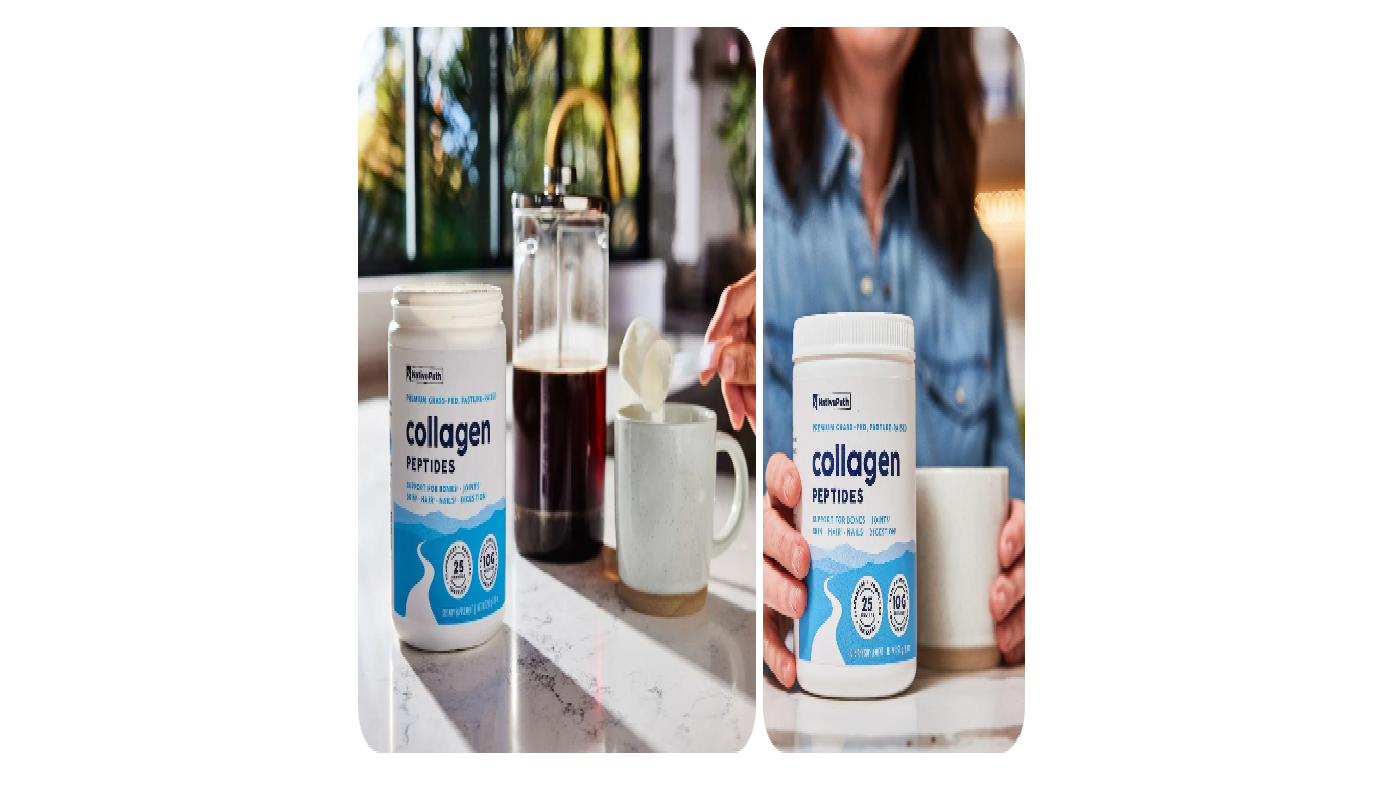
Collagen Peptides Jar Reviews: Real User Experiences, Benefits & Side Effects
This comprehensive guide explores the real-world benefits, limitations, and user experiences with collagen peptide supplements. Drawing from scientific evidence and authentic user testimonials, we evaluate everything from skin improvements to joint benefits, side effects, and pricing considerations to help you make an informed decision about this popular health supplement.
✅ Official Website: – Click Here Shop Now Special Offer
Introduction to Collagen Peptides
Collagen Peptides Jar have emerged as one of the fastest-growing supplements in the health and beauty markets, with sales increasing dramatically over the past five years. These supplements are derived from animal collagen—the most abundant protein in the human body that provides structural support to tissues including skin, bones, tendons, and ligaments. Unlike intact collagen, Collagen Peptides Jar undergo a process called hydrolysis that breaks the protein down into shorter amino acid chains, making them more bioavailable and easier for the body to absorb.
The appeal of Collagen Peptides Jar spans multiple demographics, from fitness enthusiasts seeking improved recovery to individuals concerned about visible signs of aging. Their versatility extends to their form—available as unflavored or flavored powders that dissolve in beverages, convenient capsules for on-the-go supplementation, or ready-to-drink liquid formulations. This variety has contributed significantly to their widespread adoption across different consumer groups.
As collagen naturally decreases with age—declining approximately 1% per year starting in our mid-20s—supplementation has become increasingly popular as a preventative and restorative approach. The supplement industry has responded with numerous formulations targeting specific benefits, from skin elasticity and joint mobility to hair strength and nail resilience. However, with countless products making bold claims, understanding the reality behind the marketing has become essential for consumers seeking genuine health improvements.
<<< Click Here To Order Collagen Peptides Jar From Official Website Now >>>
What Are Collagen Peptides?
Collagen Peptides Jar represent a specialized form of collagen that has undergone significant processing to enhance its bioavailability and practical applications in supplementation. In their natural state, collagen molecules exist as triple helices with long, wound protein chains that are difficult for the human digestive system to break down efficiently. Through enzymatic hydrolysis, these robust structures are broken into much smaller chains of amino acids called peptides, which the body can absorb more readily through the intestinal barrier and utilize more effectively.
These peptides contain distinctive amino acid profiles that set them apart from other protein supplements. They are particularly rich in glycine, proline, and hydroxyproline—amino acids that play crucial roles in the body's own collagen production and maintenance. This unique composition is why Collagen Peptides Jar are often considered superior to standard protein supplements for specific structural and connective tissue support.
The source of collagen significantly influences its applications and benefits. Bovine (cow) collagen, the most common variety, primarily contains Types I and III collagen, which support skin, bones, and connective tissues. Marine collagen, derived from fish scales and skin, offers excellent bioavailability and is rich in Type I collagen, making it particularly beneficial for skin-focused applications. Chicken collagen contains higher amounts of Type II collagen, which is specifically beneficial for cartilage support and joint health. Each source provides slightly different amino acid ratios and potential benefits, leading manufacturers to select specific sources based on their targeted health outcomes.
Types of Collagen Supplements
Type I Collagen
Comprising approximately 90% of the body's collagen, Type I forms the structural foundation for skin, bones, tendons, and ligaments. It provides tensile strength to tissues and is crucial for maintaining skin elasticity and hydration. Supplements targeting skin health and anti-aging benefits typically emphasize Type I collagen, which is abundant in both bovine and marine sources.
Type II Collagen
Primarily found in cartilage, Type II collagen plays an essential role in joint health. Its unique structure forms the framework that gives cartilage its cushioning and shock-absorbing properties. Supplements focused on joint health, particularly those formulated for individuals with osteoarthritis or active athletes, often feature Type II collagen derived from chicken sternum or other cartilaginous sources.
Type III Collagen
Working in conjunction with Type I, Type III collagen supports the structure of muscles, organs, and blood vessels. It's commonly found in fast-growing tissues and is essential for cardiovascular health. Many comprehensive collagen formulas include Type III to provide broader structural support throughout the body's various systems.
Today's market offers increasingly sophisticated multi-type collagen formulations that combine different collagen types to deliver comprehensive benefits. These "multi-collagen" products aim to address multiple health concerns simultaneously—supporting skin elasticity while also improving joint function and enhancing muscle recovery. The source of collagen also significantly impacts its efficacy and sustainability profile. Marine collagen, typically extracted from fish scales and skin, offers higher bioavailability due to its lower molecular weight but comes at a premium price point. Bovine collagen, derived from cow hides and bones, provides excellent Type I and III content at a more accessible price, making it the most widely used source in the supplement industry.
Top Brands in the Market
The collagen supplement market has expanded dramatically, with several brands establishing themselves as leaders through quality sourcing, effective formulations, and consistent results. Vital Proteins stands as perhaps the most recognized name in the industry, having pioneered mainstream collagen supplementation with their signature blue tubs of grass-fed bovine Collagen Peptides Jar. Their unflavored powder has become something of an industry standard, dissolving easily in beverages with minimal taste impact. With celebrity endorsements and widespread retail availability, they've maintained premium positioning despite their $30-45 price point for a month's supply.
Momentous has carved out a niche in the performance nutrition sector with their joint-focused collagen formulation. By combining Types I and III collagen with vitamin C and hyaluronic acid, they've created a comprehensive joint support product particularly popular among athletes and fitness enthusiasts. Their emphasis on third-party testing and banned substance certification has justified their higher price point of $55-70 per month.
Newer entrants like Nutraharmony have gained traction by offering multi-type collagen formulas enhanced with additional nutrients like biotin, hyaluronic acid, and various vitamins. This "collagen plus" approach aims to deliver more comprehensive beauty and health benefits in a single product. Meanwhile, brands like Live Conscious have positioned themselves at more accessible price points ($25-35 monthly), though consumer feedback suggests more variable results and occasional issues with dissolution quality.
Across the spectrum of collagen supplements, monthly costs typically range from $25 for basic formulations to $70 for premium products with additional bioactive ingredients. Many brands offer subscription options that reduce prices by 10-15%, recognizing that collagen supplementation requires consistent, long-term use to deliver meaningful results.
<<< Click Here To Order Collagen Peptides Jar From Official Website Now >>>
Skin Benefits: What Users Report
One of the most frequently cited reasons for starting collagen supplementation is to improve skin health and appearance, and user experiences reveal both promising outcomes and important nuances. Improved skin hydration consistently emerges as the most noticeable and quickly realized benefit among collagen users. Many report that their skin feels more moisturized and plump within the first 4-6 weeks of consistent supplementation, even before visible changes in wrinkles or texture become apparent. This hydration effect appears particularly pronounced for individuals with naturally dry skin or those living in arid climates.
Enhanced skin elasticity represents another commonly reported benefit, though the timeline for these improvements tends to be longer—typically 2-3 months of daily supplementation. Users in their 40s and beyond report more significant improvements in skin resilience and bounce-back quality compared to younger users. This aligns with the understanding that collagen supplementation may be most beneficial for those already experiencing natural collagen decline. The reduction in fine lines and wrinkles generates more mixed feedback, with most users describing moderate rather than dramatic improvements. The effect appears most noticeable for expression lines around the eyes and forehead rather than deeper set wrinkles.
Importantly, user reports suggest that the benefits are more subtle than the transformative results often suggested in marketing materials. Older users with more significant collagen depletion tend to observe more visible improvements than younger individuals with naturally higher collagen levels. Those with mature or dry skin typically report more satisfaction with the results than those with oily or combination skin types. Many users also note that photographs taken before beginning supplementation help track gradual improvements that might otherwise go unnoticed in day-to-day observation. This highlights the incremental nature of collagen's skin benefits, which accumulate gradually rather than dramatically.
✅ Official Website: – Click Here Shop Now Special Offer
Hair and Nail Benefits
Hair Growth Improvements
Consistent collagen supplementation has been associated with accelerated hair growth rates in many user reports. Multiple reviewers describe noticing that their hair requires more frequent trimming, with some measuring increases of up to 20% in monthly growth. The effect appears to be enhanced in individuals who previously experienced slow hair growth or recent thinning. However, the impact on hair thickness shows more variation, with some users reporting visibly thicker strands while others notice minimal change in diameter. The enhanced growth typically becomes evident after 4-6 weeks of daily supplementation.
Nail Strength Benefits
Improved nail resilience represents one of the more consistently reported benefits across collagen users. Many individuals who previously experienced frequent nail breakage, splitting, or peeling note significant improvements in nail integrity after 6-8 weeks of supplementation. The effect appears particularly pronounced in those with historically brittle nails. Users frequently mention being able to grow their nails longer without breakage, with numerous reviews specifically highlighting reduced splitting at the nail edge—a common problem for those with naturally fragile nails.
The timeline for visible improvements in both hair and nail health tends to be longer than for skin benefits, likely reflecting the growth cycles of these tissues. Most users report beginning to notice changes around the 6-8 week mark, with improvements continuing to accumulate with ongoing supplementation. This gradual progression makes sense physiologically, as new hair and nail growth incorporating the benefits of enhanced collagen and amino acid availability would need time to become visible.
It's worth noting that user experiences with hair and nail benefits appear more variable than those related to skin hydration. This variability may reflect differences in individual baseline nutrition, overall protein intake, or genetic factors influencing hair and nail quality. Some users who see minimal skin improvements nevertheless report significant changes in nail strength or hair growth, suggesting that the mechanisms and individual responsiveness may differ across these various benefits. This reinforces the importance of consistent supplementation for at least 2-3 months before evaluating efficacy, as the most visible improvements often require this sustained intake to become apparent.
Joint and Mobility Benefits
Joint pain reduction and improved mobility represent some of the most compelling and consistently reported benefits of collagen peptide supplementation. Particularly among active individuals and those with age-related joint discomfort, collagen appears to offer meaningful improvements in daily comfort and functional capacity. Users frequently report noticeable reductions in knee pain, especially during and after physical activities like running, hiking, or stair climbing. This benefit seems particularly pronounced among individuals who engage in regular exercise, suggesting a potential synergistic effect between collagen supplementation and physical activity.
The mechanism behind these improvements likely involves collagen's role in supporting cartilage structure and joint integrity. Users with shoulder stiffness or minor rotator cuff issues frequently mention improved range of motion and decreased discomfort after 6-8 weeks of consistent supplementation. Similarly, individuals with minor hand joint discomfort report enhanced dexterity and reduced morning stiffness, benefits that significantly impact quality of life and daily functioning. These improvements often manifest gradually, with subtle enhancements in comfort building over several months of supplementation.
Among weightlifters and strength athletes, improved recovery time emerges as a particularly valued benefit. Multiple reviews mention reduced post-workout joint discomfort and faster return to training capacity. This recovery enhancement may reflect collagen's contribution to connective tissue repair and maintenance, helping to support the ligaments and tendons under stress during resistance training. The joint-related benefits generally become noticeable after 6-8 weeks of consistent use, though some users report initial improvements within 3-4 weeks.
Importantly, the joint benefits appear to be most pronounced when collagen supplements include complementary ingredients like vitamin C, which plays an essential role in collagen synthesis, or hyaluronic acid, which supports joint lubrication. Many users also note that the effects seem cumulative, with continued improvement over 3-6 months of regular supplementation. This progressive enhancement suggests that collagen may be supporting structural improvements in joint tissues rather than simply providing temporary symptom relief.
Scientific Evidence
While anecdotal reports provide valuable insights into real-world experiences with collagen supplements, scientific research offers a more structured evaluation of their efficacy. The strongest evidence supports collagen's benefits for skin health. Multiple randomized, placebo-controlled studies have demonstrated measurable improvements in skin elasticity, with participants showing increased dermal matrix density and enhanced skin mechanical properties after 8-12 weeks of supplementation. A particularly notable 2019 review of eleven studies found that Collagen Peptides Jar consistently improved skin hydration, elasticity, and dermal collagen density, with the most pronounced effects in participants over 50 years of age.
Research on joint health benefits has also shown promising results, though with somewhat more variable outcomes. Several studies involving athletes and individuals with activity-related joint discomfort have demonstrated reductions in joint pain and improved function with collagen supplementation. A 24-week study published in Current Medical Research and Opinion found that athletes experiencing knee pain showed significant improvements when taking 10g of collagen daily compared to a placebo group. However, research specifically on osteoarthritis has produced more mixed results, suggesting that collagen may be more effective for activity-related joint stress than for advanced degenerative conditions.
The scientific evidence for hair and nail benefits remains more limited, with fewer controlled studies specifically examining these outcomes. The available research suggests potential benefits for nail strength and growth rate, but many studies suffer from small sample sizes or methodological limitations. Hair benefits, while frequently reported anecdotally, have the least robust clinical validation, with most evidence coming from smaller studies or those examining biomarkers related to hair health rather than direct growth measurements.
It's worth noting that across all benefit categories, the scientific effects documented tend to be moderate rather than dramatic—an important distinction from the sometimes extravagant claims made in marketing materials. The research consistently indicates that benefits accumulate gradually with daily supplementation over months rather than weeks, and that effects may vary significantly between individuals based on age, baseline health status, and other factors. Furthermore, studies typically use carefully standardized collagen formulations at specific dosages (usually 2.5-15g daily), which may not correspond exactly to all commercially available products.
Common Side Effects
Digestive Discomfort
The most frequently reported side effect is mild gastrointestinal disturbance, particularly during the first few weeks of supplementation. Users describe sensations of fullness, mild bloating, or occasional heartburn after taking collagen, especially when consumed on an empty stomach. These symptoms typically diminish after 1-2 weeks as the body adjusts to the supplement.
Feelings of Fullness or Bloating
Some users report feeling uncomfortably full after taking collagen supplements, particularly at higher doses. This effect may relate to collagen's protein content and its interaction with stomach acids. Starting with a half dose and gradually increasing to the full recommended amount can help minimize this side effect.
Allergic Reactions
Though rare, allergic responses may occur in individuals with sensitivities to specific collagen sources. Symptoms can include skin rashes, itching, or in severe cases, difficulty breathing. Those with known allergies to fish should avoid marine collagen, while those with bovine protein sensitivities should avoid beef-sourced products.
Taste and Texture Issues
Unflavored collagen powder supplements can impart subtle but detectable tastes to beverages, which some users find unpleasant. Additionally, improper mixing can result in a gritty texture or clumping in cold liquids. Many users overcome this by blending collagen into smoothies, coffee, or foods rather than simple water.
Despite these potential side effects, Collagen Peptides Jar are generally considered safe for most individuals, with serious adverse reactions being extremely rare in healthy adults. The digestive discomfort reported by some users typically resolves with continued use as the body adapts to the supplement. For those experiencing persistent side effects, adjusting the timing of consumption (taking with food rather than on an empty stomach), reducing the dosage temporarily, or switching to a different collagen source may prove helpful.
It's worth noting that the quality and purity of collagen supplements can significantly influence the likelihood and severity of side effects. Products with minimal additional ingredients and those subjected to third-party testing for contaminants tend to be better tolerated. Those with sensitive digestive systems may also benefit from formulations that include digestive enzymes specifically designed to enhance protein breakdown and absorption.
User Reviews: Positive Experiences
Analyzing hundreds of verified purchase reviews across multiple collagen brands reveals consistent patterns of positive experiences that provide valuable insights for potential users. Athletic performance and recovery improvements stand out among the most enthusiastically reported benefits. Numerous reviewers describe significant changes in their post-workout recovery time, with statements like "After two months of daily use, my recovery time improved significantly—I'm not waking up as stiff after intense training sessions" appearing frequently in the feedback. These recovery benefits seem particularly pronounced among users over 40 who engage in regular strength training or high-impact activities.
Skin improvements generate equally positive feedback, though with an emphasis on subtle, gradual changes rather than dramatic transformations. Many users specifically mention improvements in the delicate skin around the eyes, with reviews often noting, "The fine lines around my eyes are less noticeable, and my skin feels more hydrated overall." These skin-related benefits appear most consistently in reviews from users who have maintained daily supplementation for three months or longer, reinforcing the cumulative nature of collagen's effects on dermal tissues.
Hair and nail enhancements receive particularly strong positive feedback from long-term users. Comments like "My hair is growing faster than before, and my nails aren't breaking as often as they used to" appear regularly in reviews from those who have used collagen for 8+ weeks. Female users over 35 appear especially likely to report these benefits, often describing them as unexpected but welcome additional effects beyond their original skin-focused supplementation goals.
Joint mobility improvements generate some of the most emotionally positive reviews, with users expressing significant quality of life enhancements. Statements such as "I don't wake up with the same stiffness in my shoulders and knees that I used to experience daily" reflect the meaningful impact these benefits have on daily comfort and functionality. Users who combine collagen supplementation with regular exercise report the most pronounced joint-related improvements, suggesting synergistic effects between physical activity and collagen intake. These mobility benefits appear particularly valuable to users in their 50s and beyond, many of whom describe collagen as an integral part of their active lifestyle maintenance strategy.
User Reviews: Critical Feedback
Limited Hair and Nail Results
"I've been taking this collagen supplement religiously for six weeks, and I haven't seen the drastic changes in my hair or nails that I was hoping for. My nails seem slightly stronger, but my hair hasn't shown any noticeable difference in thickness or growth rate. I'll continue for another month to see if the effects are just taking longer to appear." - Melissa, 34
Product Dissolution Issues
"The benefits might be there, but mixing this powder is a daily frustration. It is a clumpy mess that I have to keep on stirring, and even then, it leaves an unpleasant texture in my morning coffee. I've tried hot and cold liquids with the same result. I'm considering switching to capsules despite the higher cost, just to avoid the inconvenience." - James, 42
Timeline Expectations
"I was hoping for quicker results based on the marketing claims. After four weeks, I'm not seeing any significant difference in my skin's appearance. The before and after photos in the ads showed dramatic improvements that I'm just not experiencing. I'll give it the full 90 days as recommended, but I'm skeptical about whether the results will ever match the promises." - Sophia, 51
Subtle Rather Than Dramatic Effects
"After completing my first container (about 30 days), the results are much more subtle than I expected. I do notice slightly better hydration in my skin, but the wrinkle reduction is minimal at best. I think the marketing sets unrealistic expectations about how transformative this supplement can be. It's a good addition to my routine, but not the miracle product it's often portrayed as." - Robert, 47
These critical reviews highlight important patterns that potential users should consider when evaluating collagen supplements. Expectation management emerges as perhaps the most crucial factor in user satisfaction. Those anticipating dramatic, rapid transformations often express disappointment, while users with more moderate expectations frequently report greater satisfaction with the gradual improvements they observe. This discrepancy suggests that marketing claims may sometimes create unrealistic expectations about both the magnitude and timeline of potential benefits.
Product quality and formulation issues also feature prominently in negative feedback. Dissolution problems appear particularly common, with many users expressing frustration about clumping, grittiness, or incomplete mixing in beverages. These practical considerations significantly impact the daily user experience and adherence to supplementation regimens, potentially undermining long-term benefits if they lead to inconsistent use. Some negative reviews also mention taste concerns, particularly with unflavored formulations that alter the flavor profile of beverages more than expected.
The variability in individual response rates constitutes another common theme in critical reviews. While some users report noticeable benefits within weeks, others experience minimal changes even after months of consistent use. This inconsistency likely reflects biological differences in collagen metabolism, baseline collagen status, and other factors that influence responsiveness to supplementation. It reinforces the reality that collagen supplementation, like many nutritional interventions, produces significantly different outcomes across diverse user populations.
<<< Click Here To Order Collagen Peptides Jar From Official Website Now >>>
Formulation Differences
Delivery Format Variations
The primary division in collagen supplements exists between powders, capsules, and liquid formulations, each offering distinct advantages. Powders typically provide the highest dose per serving (usually 10-20g) at the most economical price point, but require mixing and may present taste or texture challenges. Capsules offer convenience and portability but deliver significantly smaller amounts per serving (typically 0.5-1g per capsule), requiring multiple pills to reach therapeutic dosages. Liquid formulations promise ready-to-drink convenience and sometimes enhanced absorption, but generally come at premium price points and may contain additional ingredients or preservatives.
Added Ingredients
Beyond the base Collagen Peptides Jar, formulations increasingly incorporate complementary ingredients to enhance specific benefits. Vitamin C features prominently as it plays an essential role in the body's natural collagen synthesis. Hyaluronic acid appears in many skin-focused formulations to support hydration and dermal volume. Biotin is commonly added to target hair and nail benefits, while specialized joint formulations may include glucosamine, chondroitin, or MSM. Some premium products incorporate probiotics, adaptogens, or antioxidant compounds to provide broader health benefits beyond the core collagen functions.
Flavor profiles represent another significant differentiator among collagen products. Unflavored options dominate the market, designed to blend unobtrusively into coffee, smoothies, or foods. However, many users report that even "unflavored" formulations impart subtle tastes that can affect beverage enjoyment. In response, manufacturers have developed increasingly sophisticated flavored options ranging from vanilla and chocolate to fruit varieties and even coffee flavors specifically designed to enhance rather than compete with morning beverages. These flavored options typically contain natural or artificial sweeteners and flavorings that may influence both taste satisfaction and overall ingredient quality.
The collagen type composition varies substantially across products and significantly impacts their targeted benefits. Single-type formulations focus on specific health outcomes—Type I for skin benefits or Type II for joint support. Multi-collagen products containing Types I, II, III, and sometimes V and X aim to address comprehensive health goals simultaneously, though potentially at lower concentrations of each specific type. The protein content per serving also differs markedly between products, ranging from as little as 6g to as much as 20g per serving in high-concentration formulations. This variation affects not only the potential efficacy but also how the supplement fits into an individual's overall protein intake and nutritional planning.
Finally, quality indicators like third-party testing, sourcing transparency, and processing methods constitute important but often overlooked formulation differences. Premium products typically provide detailed information about collagen sourcing (grass-fed, wild-caught, etc.), processing temperatures (which can affect peptide integrity), and independent verification of purity and potency. These quality factors may significantly influence both efficacy and the presence of contaminants or processing residues, though they often remain invisible to consumers focused primarily on front-label claims and pricing.
Price Comparison
The collagen supplement market spans a broad price spectrum, with monthly costs ranging from approximately $25 for basic formulations to $70 for premium products with additional bioactive ingredients. This price variation reflects significant differences in formulation complexity, collagen sourcing, additional ingredients, and brand positioning. Understanding these price differentials can help consumers make more informed decisions about value and quality alignment with their specific health goals and budget constraints.
At the lower end of the price spectrum ($25-35 monthly), products typically offer straightforward collagen formulations with minimal additional ingredients. These basic options often provide good value for consumers primarily interested in the foundational benefits of Collagen Peptides Jar without specialized enhancements. Brands in this category frequently use bovine collagen from conventional rather than grass-fed sources, which reduces production costs. While these products may deliver core benefits, they sometimes compromise on dissolution quality or flavor profile, potentially affecting the daily user experience and long-term compliance.
Mid-range products ($35-50 monthly) represent the largest segment of the market, offering enhanced formulations with moderate price premiums. These often feature higher-quality collagen sources (grass-fed bovine or wild-caught marine), superior dissolution properties, and select complementary ingredients like vitamin C or hyaluronic acid. Many established brands like Vital Proteins occupy this middle tier, balancing quality sourcing with reasonable accessibility. Subscription options in this category typically reduce monthly costs by 10-15%, providing significant savings for committed users while encouraging consistent use—an important factor for achieving cumulative benefits.
Premium offerings ($50-70 monthly) typically provide multi-collagen formulations combining multiple types (I, II, III, V, and X) with comprehensive supporting nutrient profiles. These products often emphasize specialized sourcing criteria (marine collagen from wild fish, bovine collagen from grass-fed pasture-raised cattle), third-party testing protocols, and proprietary processing methods claimed to enhance bioavailability. The higher price point also frequently correlates with more extensive complementary ingredients—not just vitamin C, but also complex hyaluronic acid complexes, specialized botanical extracts, probiotics, or proprietary nutrient blends. For those seeking comprehensive support for multiple health goals simultaneously, these higher-priced options may provide value despite their cost premium.
How to Choose the Right Collagen
Identify Your Primary Health Goals
Begin by clarifying your main objectives for taking collagen. If skin elasticity and hydration are your primary concerns, formulations emphasizing Type I collagen (particularly from marine sources) may be most appropriate. For joint support and mobility, products containing Type II collagen, often with complementary ingredients like hyaluronic acid or MSM, would be more suitable. Those seeking comprehensive benefits might prefer multi-collagen products containing Types I, II, and III, though potentially at lower concentrations of each.
Evaluate Complementary Ingredients
Look beyond the collagen content to assess supporting nutrients that may enhance specific benefits. Vitamin C is crucial for collagen synthesis and should ideally be present in formulations. Hyaluronic acid supports skin hydration and joint lubrication. Biotin enhances hair and nail benefits. For joint-focused products, ingredients like glucosamine and chondroitin provide additional supportive mechanisms. Be wary of formulations with excessive fillers, artificial colors, or unnecessary additives that may reduce overall quality.
Verify Quality Certifications
Prioritize products with transparent quality verification. Look for third-party testing certifications, Good Manufacturing Practice (GMP) compliance, and clear sourcing information. For bovine collagen, grass-fed certification indicates higher quality sourcing. Marine collagen should specify sustainable harvesting practices. NSF Certified for Sport certification is valuable for athletes concerned about banned substances. These quality indicators reflect manufacturer commitment to purity and potency.
Consider Source Appropriateness
The collagen source significantly impacts both benefits and suitability. Marine collagen offers excellent bioavailability and is rich in Type I collagen, making it particularly effective for skin benefits. It's also appropriate for pescatarians. Bovine collagen provides a balanced profile of Types I and III at a more accessible price point but isn't suitable for vegetarians. Those with specific dietary restrictions or allergies should carefully evaluate source compatibility with their needs.
Beyond these key selection criteria, practical considerations like form preference can significantly impact long-term adherence. While powders offer economic advantages and higher doses per serving, they require daily mixing and may present taste challenges. Capsules provide convenience but typically deliver smaller amounts, requiring multiple pills to reach therapeutic dosages. This form consideration should be balanced against your personal routine and preferences to ensure consistent long-term use—the most crucial factor for realizing collagen's cumulative benefits.
Optimal Dosage and Usage
Clinical research and user experiences suggest that collagen peptide efficacy is highly dose-dependent, with most studies demonstrating benefits at daily intakes between 10-15 grams. This range appears to provide sufficient amino acid building blocks to meaningfully support the body's collagen-dependent tissues while remaining practical for consistent supplementation. Lower doses (2.5-5g) may still offer benefits, particularly for skin outcomes, but typically require longer timeframes to produce noticeable results. Higher doses (15-20g) haven't consistently demonstrated proportionally greater benefits in research, though some individuals, particularly those engaging in intensive physical training, report enhanced recovery at these higher intakes.
The timing of collagen consumption may influence its effectiveness, though research in this area remains limited. Many experts recommend morning consumption, ideally 30-60 minutes before breakfast, to maximize absorption when the digestive system is relatively empty. However, user experiences suggest that consistency is ultimately more important than specific timing—taking collagen reliably at any consistent time appears more beneficial than optimal timing with irregular use. For those using collagen specifically for exercise recovery, some research suggests taking it 30-60 minutes before workout sessions may enhance its incorporation into connective tissues under stress during the activity.
Versatility in consumption methods represents one of collagen's practical advantages. While mixing with beverages remains the most common approach, Collagen Peptides Jar can be incorporated into numerous foods without significantly altering their taste or texture. Hot liquids like coffee or tea provide excellent dissolution properties, while blending into smoothies can mask any subtle flavor. Baking with collagen (adding to muffins, pancakes, or bread recipes) represents another approach, though prolonged high-temperature exposure may partially degrade some peptide structures. Creative users report success adding collagen to oatmeal, yogurt, soups, and even pasta sauces to reach their daily intake goals without supplement fatigue.
Realistic timeline expectations prove crucial for user satisfaction. Most clinical studies and consistent user reports indicate that noticeable improvements typically emerge after 4-12 weeks of daily supplementation, with effects continuing to accumulate over 6+ months of consistent use. Skin hydration benefits often appear first (sometimes within 2-4 weeks), while structural improvements in skin elasticity, hair strength, and joint comfort generally require at least 8-12 weeks to become apparent. Setting appropriate expectations about this timeline can help prevent premature discontinuation before the full benefits manifest. Photographic documentation at 4-week intervals provides an objective method for tracking gradual improvements that might otherwise go unnoticed in day-to-day observation.
<<< Click Here To Order Collagen Peptides Jar From Official Website Now >>>
Who Should Consider Collagen Supplements
Adults with Joint Discomfort
Individuals experiencing early signs of joint stiffness or discomfort, particularly in weight-bearing joints like knees and hips, may benefit significantly from collagen supplementation. The amino acid profile of collagen provides building blocks for cartilage maintenance and joint tissue repair. Those who notice increased stiffness after exercise or prolonged sitting represent prime candidates for these benefits.
Those Concerned About Skin Aging
Adults noticing decreased skin elasticity, increasing dryness, or the development of fine lines may find collagen particularly beneficial. Since natural collagen production begins declining around age 25-30, supplementation often provides more noticeable benefits for those in their mid-30s and beyond who are experiencing the cumulative effects of this natural decrease.
People with Brittle Nails or Hair Concerns
Those experiencing increased nail breakage, splitting, or peeling may benefit from collagen's structural support properties. Similarly, individuals noticing changes in hair growth rate, thickness, or resilience—particularly women experiencing post-pregnancy hair changes or those with age-related thinning—often report improvements with consistent supplementation.
Active Individuals Seeking Recovery Support
Athletes and regular exercisers, especially those engaged in high-impact activities or resistance training, may benefit from collagen's support for connective tissues including tendons and ligaments. Those experiencing longer recovery times or minor connective tissue discomfort often report improved resilience and faster return to activity.
Age represents a significant factor in determining potential benefit from collagen supplementation. While younger adults with optimal natural collagen production may experience more subtle effects, those over 35 typically report more noticeable improvements as supplementation helps counteract the natural decline in collagen synthesis. The benefit curve appears to continue increasing with age, with many users in their 50s, 60s, and beyond reporting some of the most meaningful improvements in skin quality, joint comfort, and overall tissue resilience.
Lifestyle factors also influence who might benefit most from collagen supplementation. Those with high sun exposure history may find collagen particularly helpful in supporting skin structure already compromised by UV damage. Individuals following low-protein diets might benefit from collagen's contribution to overall amino acid intake, while those with digestive sensitivities often tolerate Collagen Peptides Jar better than other protein supplements due to their pre-hydrolyzed nature. Active individuals experiencing the cumulative effects of mechanical stress on joints and connective tissues typically report some of the most significant functional benefits.
It's worth noting that the benefits of collagen supplementation appear most pronounced when combined with complementary lifestyle approaches. Those who pair collagen intake with adequate hydration, balanced nutrition, regular physical activity, and appropriate sun protection typically report the most satisfying outcomes. This suggests that collagen works best as part of a comprehensive approach to tissue health rather than as an isolated intervention expected to overcome multiple lifestyle factors affecting skin, joint, and connective tissue integrity.
✅ Official Website: – Click Here Shop Now Special Offer
Who Should Avoid Collagen Supplements
Those with Specific Animal Protein Allergies
Individuals with known allergies to bovine (beef) products should avoid collagen sourced from cattle. Similarly, those with fish or shellfish allergies should exercise caution with marine collagen, as these may trigger allergic responses ranging from mild skin reactions to more serious symptoms. Always check the specific source of Collagen Peptides Jar if you have any animal protein sensitivities.
Vegans and Strict Vegetarians
All commercially available collagen supplements are derived from animal sources, as collagen is inherently an animal protein not found in plant materials. Despite some marketing claims about "plant-based collagen boosters," these products do not contain actual Collagen Peptides Jar but rather nutrients that may support the body's own collagen production. True collagen supplementation remains incompatible with vegan dietary restrictions.
People with Certain Kidney Conditions
Those with impaired kidney function or specific kidney diseases may need to limit protein intake, including collagen supplements. The kidneys process the breakdown products of protein metabolism, and high protein intake can potentially increase their workload. Individuals with kidney concerns should consult with their healthcare provider before adding collagen or other protein supplements to their regimen.
Individuals on Specific Medications
While direct drug interactions with collagen are uncommon, the calcium content in some collagen products may potentially interfere with certain antibiotics (like tetracyclines or fluoroquinolones) or thyroid medications. Additionally, collagen's potential effect on wound healing and blood clotting means those on blood thinners should consult healthcare providers before supplementation, particularly before surgical procedures.
Those following protein-restricted diets for specific health conditions should approach collagen supplementation with caution. Since collagen is fundamentally a protein source, it contributes to daily protein intake and must be accounted for within dietary restrictions. Individuals with conditions like phenylketonuria (PKU) should be aware that collagen contains phenylalanine, an amino acid that must be strictly limited in this condition. Similarly, those on specialized dietary protocols for certain liver conditions may need to carefully monitor protein intake from all sources, including supplements.
Pregnant or breastfeeding women should exercise normal supplement caution. While no specific risks of collagen during pregnancy have been identified, and many prenatal formulations now include collagen, the limited research in this population suggests consulting with healthcare providers before adding any supplement during these periods. Those with histories of hormone-sensitive cancers should also discuss collagen supplementation with their oncology team, as some preliminary research has examined potential relationships between collagen metabolism and certain cancer progressions, though direct causative links have not been established.
Finally, individuals with histamine intolerance or mast cell disorders may experience reactions to collagen supplements, particularly marine collagen, which can be higher in histamine content. Symptoms may include headaches, digestive discomfort, or skin flushing. These individuals should start with very small amounts if trying collagen and monitor for any adverse reactions, potentially choosing bovine sources which typically have lower histamine profiles compared to marine options.
<<< Click Here To Order Collagen Peptides Jar From Official Website Now >>>
Complementary Approaches
Vitamin C
This essential nutrient serves as a critical cofactor in collagen synthesis, facilitating the hydroxylation of proline and lysine amino acids—a necessary step in collagen formation. Without adequate vitamin C, collagen production becomes impaired regardless of amino acid availability. Supplementation with 250-1000mg daily or consumption of vitamin C-rich foods like citrus fruits, bell peppers, and strawberries can significantly enhance the body's ability to utilize Collagen Peptides Jar effectively.
Hyaluronic Acid
This naturally occurring molecule holds up to 1000 times its weight in water, providing volume and hydration to skin tissues and joint fluid. When combined with collagen, hyaluronic acid creates synergistic effects for skin hydration and joint comfort. Topical application in serums (for skin benefits) or oral supplementation of 100-200mg daily (for both skin and joint benefits) can complement collagen's structural support with enhanced moisture retention.
Sun Protection
UV radiation accelerates collagen breakdown and impairs new collagen formation, potentially undermining the benefits of supplementation. Consistent use of broad-spectrum sunscreen (SPF 30+), protective clothing, and sensible sun exposure habits preserve both natural and supplemented collagen in skin tissues. This protective approach is particularly crucial for maintaining long-term improvements in skin appearance and texture.
Balanced Nutrition
Collagen synthesis requires more than just directly supplemented peptides. A diet rich in antioxidants from colorful fruits and vegetables protects existing collagen from oxidative damage. Adequate protein intake (0.8-1.2g per kg of body weight) provides a full spectrum of amino acids. Minerals like copper, zinc, and manganese serve as cofactors for enzymes involved in collagen cross-linking and maturation.
Regular Exercise
Physical activity, particularly resistance training, creates beneficial mechanical stress that stimulates collagen production in tendons, ligaments, and facial tissue. Studies show that exercise upregulates the genetic expression of collagen synthesis enzymes. The combination of collagen supplementation 30-60 minutes before exercise appears particularly effective for directing amino acids to tissues under mechanical stress.
The integration of these complementary approaches creates a comprehensive strategy for maximizing collagen's benefits beyond what supplementation alone can achieve. This multi-faceted approach addresses the various factors affecting collagen health: providing building blocks through supplementation, optimizing synthesis with cofactors like vitamin C, protecting existing collagen from damage through antioxidants and sun protection, enhancing moisture retention with hyaluronic acid, and stimulating new collagen formation through appropriate physical activity.
For those seeking skin-specific benefits, the addition of targeted topical interventions can further enhance results. Retinoids (prescription retinoids or over-the-counter retinol) have substantial research supporting their ability to boost collagen production when applied topically. Peptide serums containing signal peptides like palmitoyl pentapeptide-4 (Matrixyl) can help trigger collagen synthesis through cell signaling mechanisms. When these topical approaches are combined with internal collagen supplementation, users often report more comprehensive improvements in skin texture, resilience, and appearance than with either approach in isolation.
Conclusion: Are Collagen Peptides Worth It?
Assessing the value proposition of Collagen Peptides Jar requires balancing scientific evidence, real-world user experiences, cost considerations, and individual health priorities. The scientific research supports moderate benefits across several health domains, with the strongest evidence backing improvements in skin elasticity and hydration, particularly in individuals over 35. Joint comfort and mobility benefits also have substantial support, especially for active individuals experiencing activity-related discomfort. The scientific case for hair and nail benefits remains less robust but is supported by consistent anecdotal evidence from long-term users.
The timeline for results represents a crucial factor in determining value. Users expecting dramatic, rapid transformations often report disappointment, while those understanding the gradual, cumulative nature of collagen's benefits frequently express satisfaction with their outcomes. Most research and user experiences indicate that noticeable improvements typically require 1-3 months of consistent supplementation, with benefits continuing to accumulate over 6+ months of use. This extended timeline means that short-term trials may not fully capture potential benefits, and commitment to consistent usage plays a significant role in realizing value.
The most consistent benefits appear in the domains of joint comfort and skin hydration. Active individuals with minor joint discomfort frequently report meaningful improvements in daily comfort and mobility, while those concerned with skin appearance often notice enhanced hydration, improved texture, and moderate reductions in fine lines. These improvements, while typically not dramatic, can significantly impact quality of life and confidence—factors difficult to quantify but important in subjective value assessment.
Cost-effectiveness varies substantially based on individual response and specific health priorities. At $30-50 per month for quality formulations, collagen represents a moderate investment comparable to many other health supplements. For those experiencing noticeable improvements in joint comfort that reduce reliance on other interventions, or those who see significant skin benefits that decrease expenditure on topical products, the value calculation may be straightforward. Conversely, individuals with minimal response after adequate trial periods may reasonably conclude that their supplement budget is better allocated elsewhere.
Realistic expectations remain perhaps the most crucial factor in satisfaction with collagen supplementation. The evidence suggests that collagen offers genuine but moderate benefits that accumulate gradually with consistent use. Marketing claims often overstate both the magnitude and speed of these improvements, potentially setting users up for disappointment despite real physiological effects. Those approaching collagen with measured expectations—understanding it as a supportive nutritional intervention rather than a transformative solution—generally report greater satisfaction with their results.
Ultimately, Collagen Peptides Jar represent a well-tolerated, moderately effective supplement option for individuals with specific skin, joint, or connective tissue concerns, particularly those over 35 experiencing the effects of natural collagen decline. Their value is enhanced when incorporated into a comprehensive approach including complementary nutrients, appropriate lifestyle practices, and consistent long-term use. While not the miracle solution sometimes portrayed in marketing, the accumulated evidence suggests that quality collagen supplements deliver meaningful benefits for many users when approached with realistic expectations and a long-term perspective.
Read More Collagen Peptides Jar
https://www.eventbrite.com/e/collagen-peptides-jar-tickets-1372069620169?aff=oddtdtcreator&_gl=1*snhgny*_up*MQ..*_ga*NzI3OTM5ODQ5LjE3NDc3MjE5MDM.*_ga_TQVES5V6SH*czE3NDc3MjE5MDMkbzEkZzAkdDE3NDc3MjE5MDMkajAkbDAkaDAkZDFIMFAtOFpxUjBWaEYxN25LMTlUN2NGcDQtTGhOaGxHNUE.
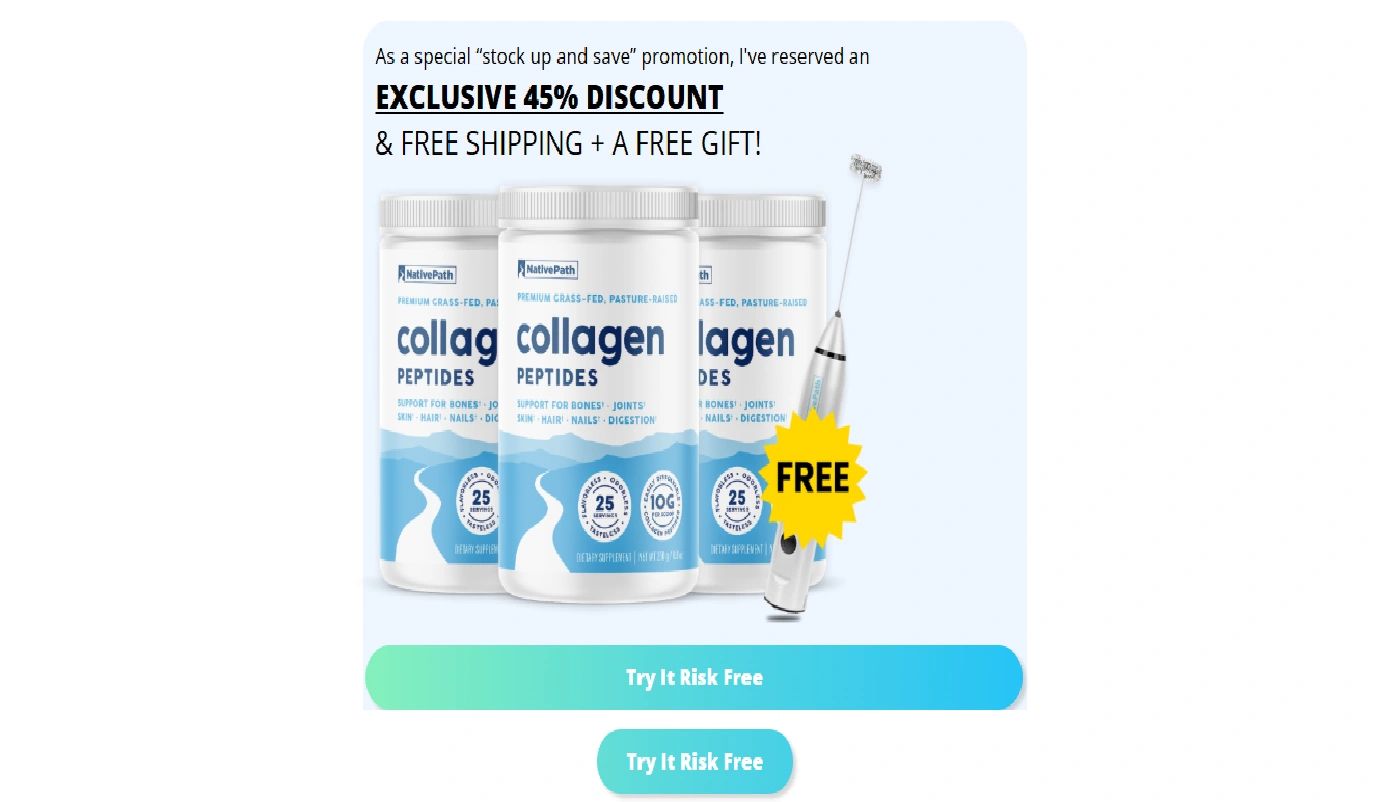





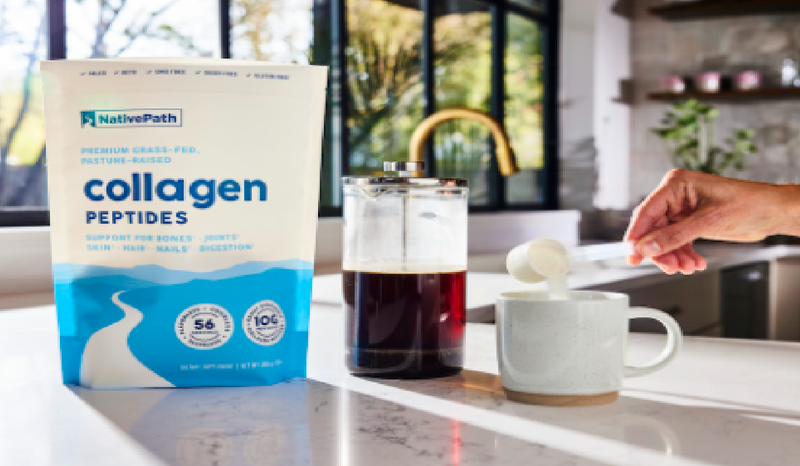
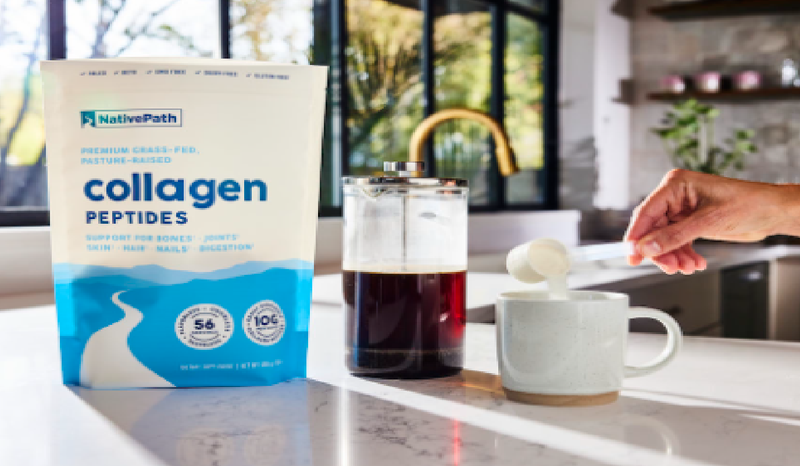
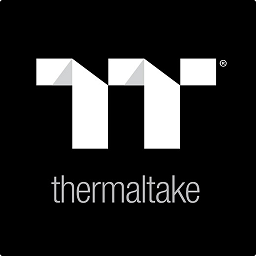




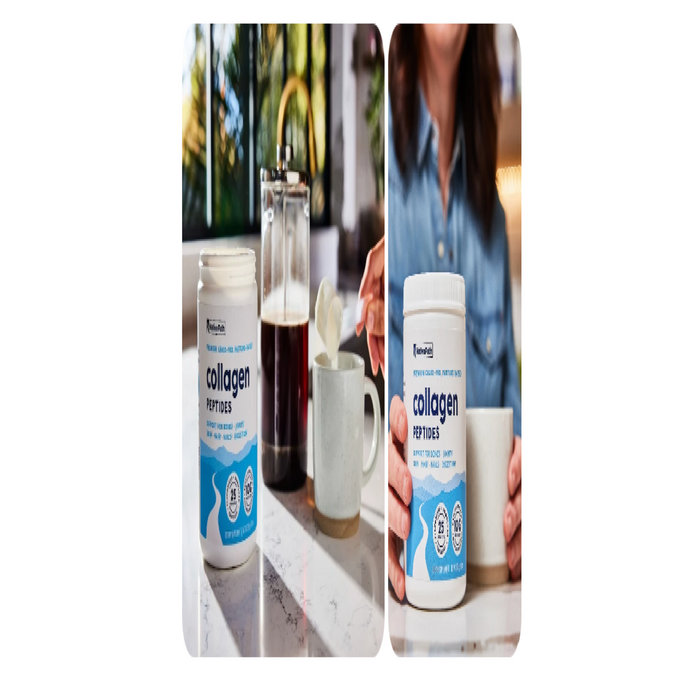
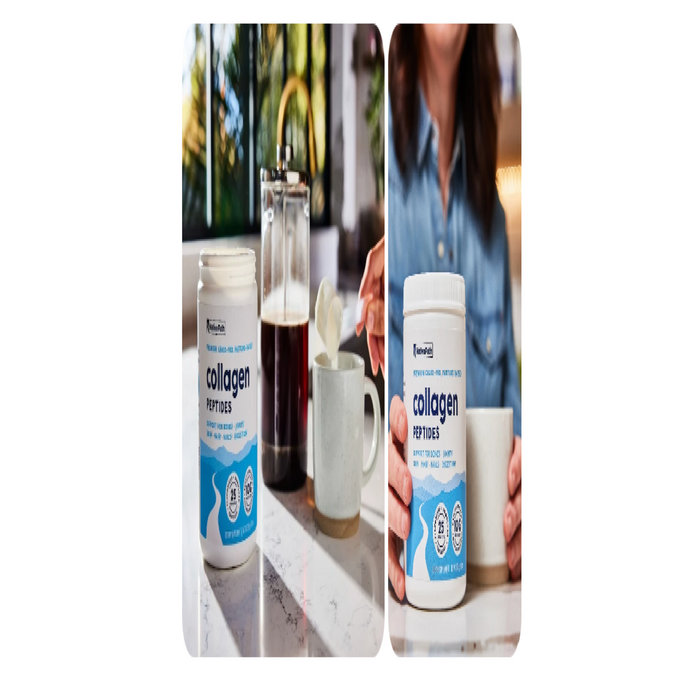
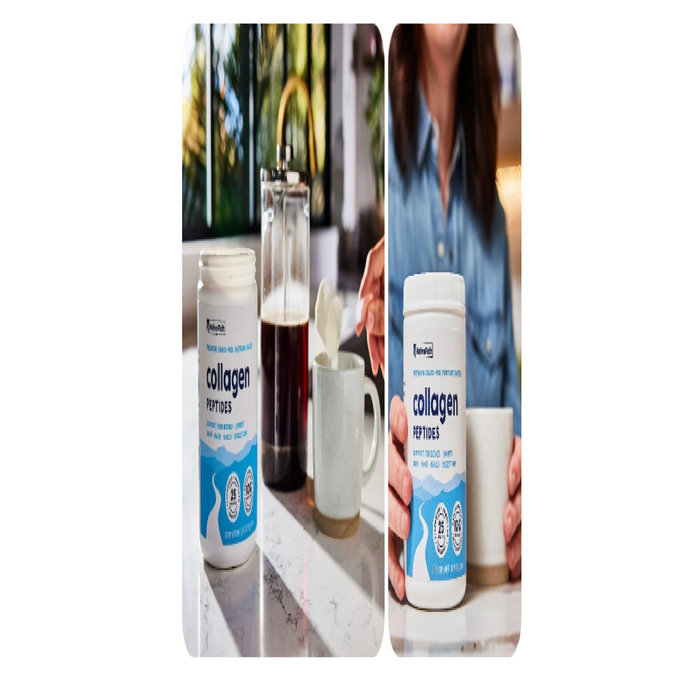
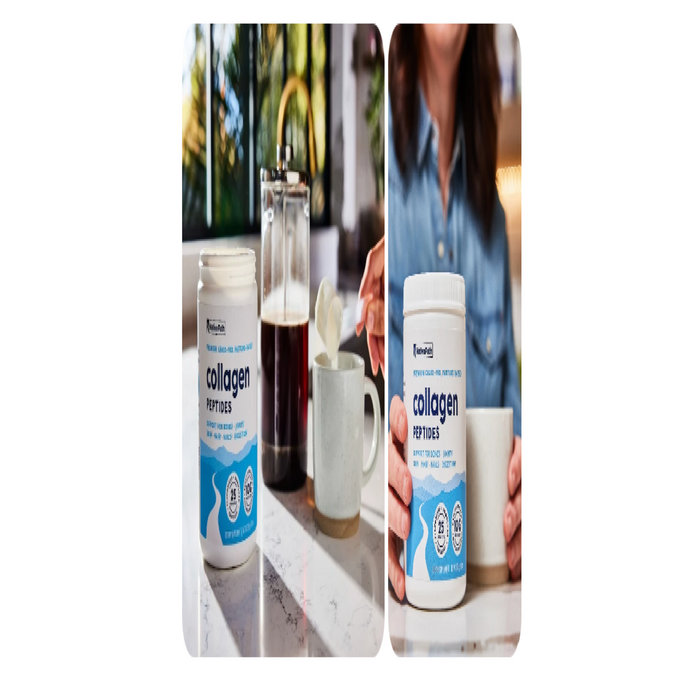
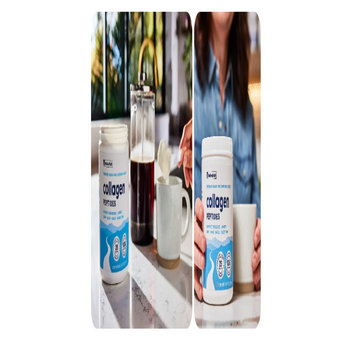
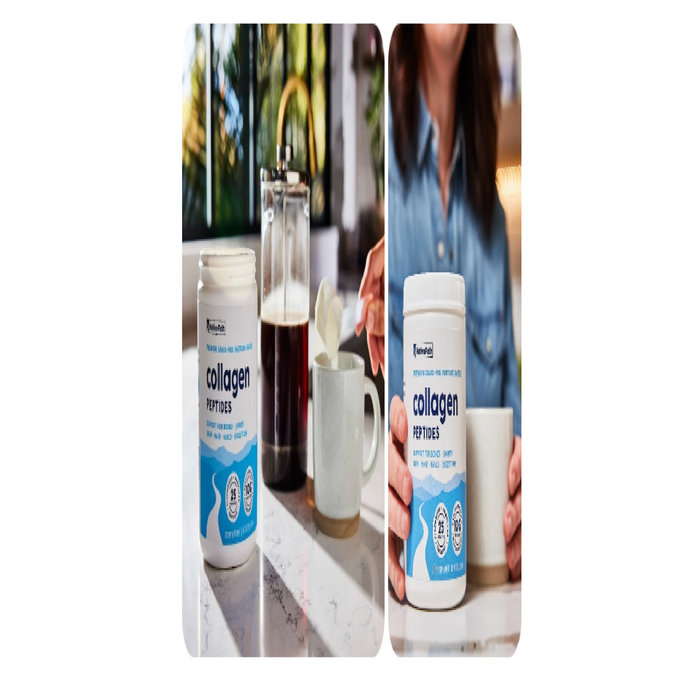

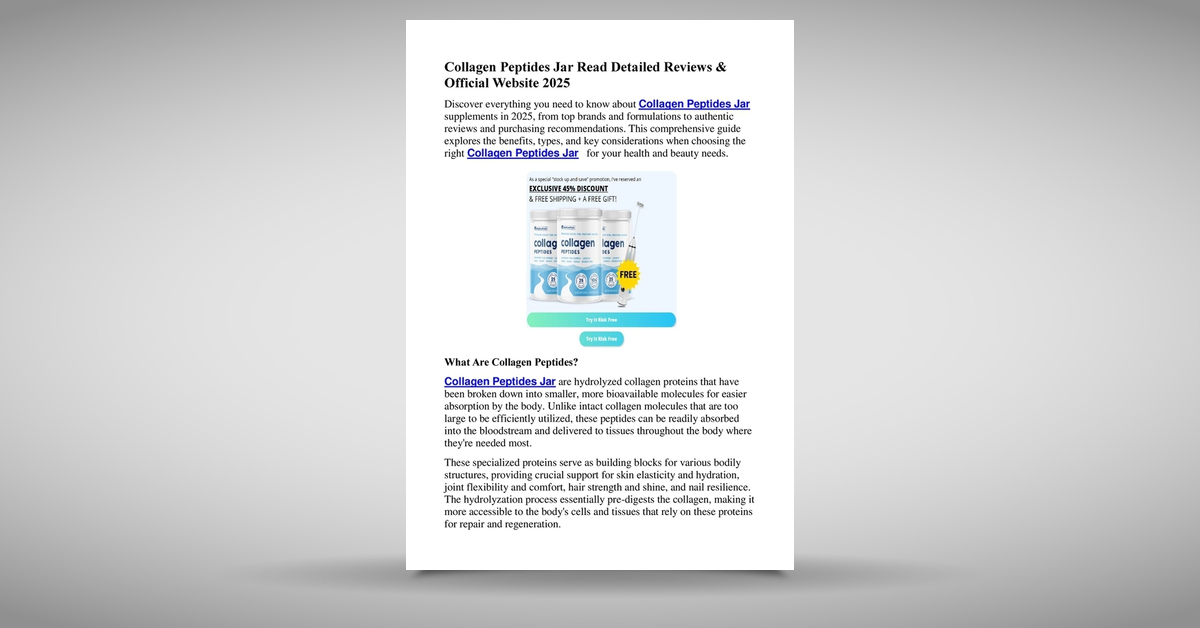
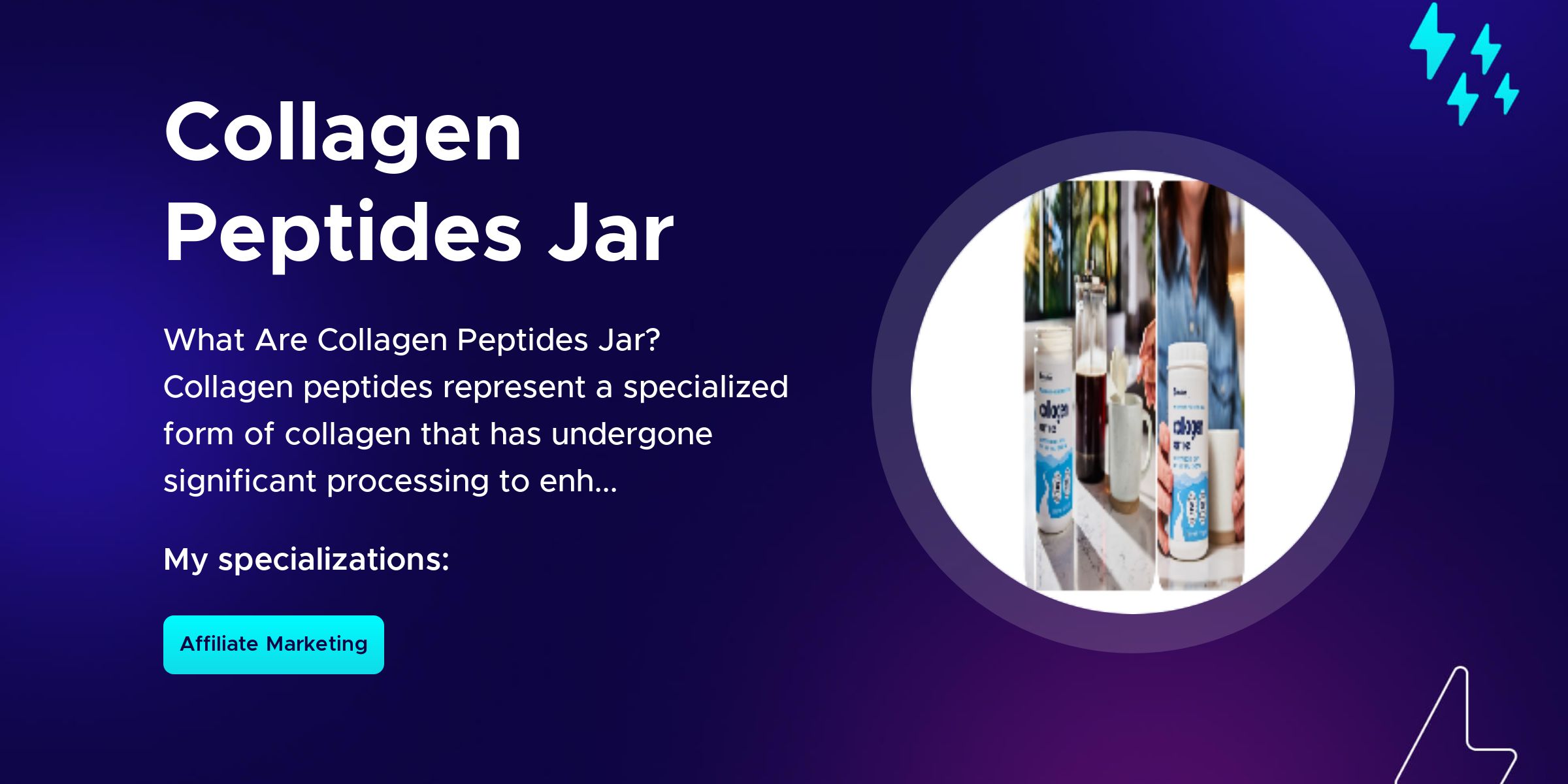

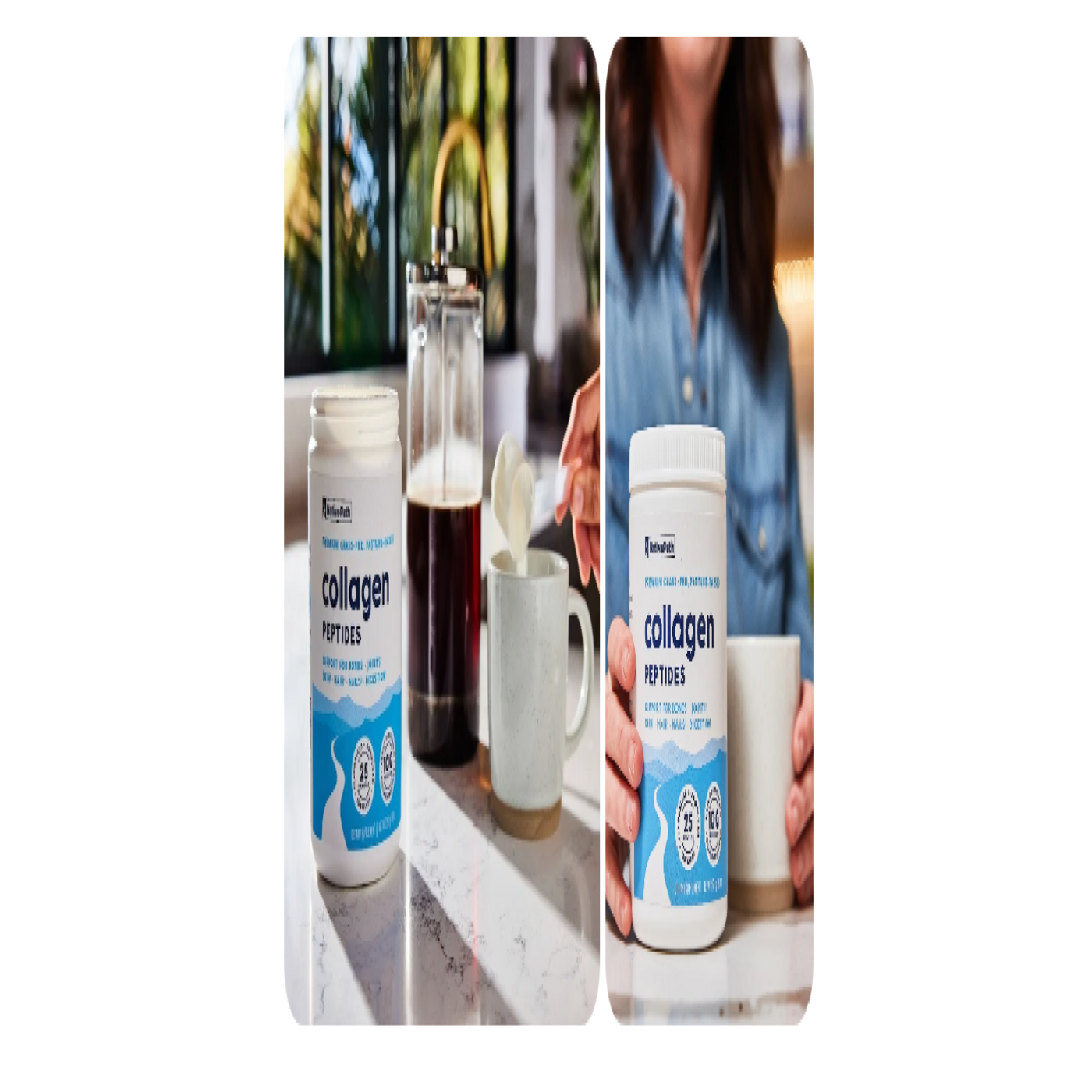







Write a comment ...